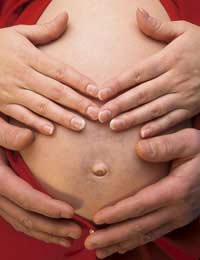Can Food in Pregnancy Cause Children's Allergies?

Allergies occur when the immune system decides that a common and harmless substance is actually harmful and reacts against it, in the same way that it would react against an infection. The body’s reaction to an allergen (the substance that causes the allergic reaction) causes a range of reactions, including itching, swelling, rashes, sneezing, running nose and eyes, sickness and diarrhoea, and, in severe cases, even problems with breathing.
Allergies in children are increasing – according to a studies, the number of children with a food allergy increased by 18% between 1997 and 2007. Of these food allergies, 90% are caused by eight types of food – milk, eggs, peanuts, tree nuts, fish, shellfish, soya and wheat. It is not completely clear. Food allergies aren’t as common as many people believe – while around 25% of people believe that they have a food allergy, actually, they only affect 4-8% of children and 2% of adults.
Why Are Allergies Becoming More Common?
It isn’t entirely clear why allergies are becoming more common in children, but there are a number of theories as to why. One suggestion is the ‘hygiene hypothesis’, which says that children grow up in smaller families and in cleaner environments, so that their immune systems are not exposed to as many viruses and bacteria. This means that the immune system does not have as many infections to fight against, so that it starts reacting against harmless substances like pollen or food. Other theories include the decline in breastfeeding and the increase in atmospheric pollutants.Preventing Allergies during Pregnancy
Women who have allergies, asthma and eczema themselves, or have family members including a child with allergies, asthma or eczema, have a higher risk of having children who might have similar allergic conditions. Research carried out in Australia and presented at a conference in the USA in March 2010 suggested that women who already have a child with a food allergy or an airborne allergy, or asthma and eczema, and who avoid eating foods like peanuts, tree nuts, milk, and eggs during pregnancy can reduce the risk of the new baby developing allergies, eczema and asthma. It is still vitally important for the health of both the mother and baby to maintain a good, healthy and balanced diet, and pregnant women should only avoid foods with the advice of a doctor or other health professional. Avoiding smoking during pregnancy can also reduce the risk of allergies and asthma, and will also improve the general health of the unborn child.Preventing Allergies While Breastfeeding
Exclusively breastfeeding babies for the first six months or year seems to protect them against allergies, infections and asthma, as well as giving them other health advantages. Some allergens do cross over from the mother to baby through the breast milk, and for women with a family history of allergies, or with other children with allergies, avoiding these foods when breastfeeding may reduce the risk of the new baby developing allergies.- Can Allergies Stunt Growth?
- Are Vaccines Safe for Children With Allergies?
- Myths About Allergies
- Are Allergies Inherited?
- How Do Allergy Drugs Work?
- How to Reduce the Risk of Allergy
- Can Children Grow Out of Allergies?
- Quiz: Can you Spot Allergy Warning Signs
- Quiz: How Much Do You Know About Kids Allergies?
- Alternative and Holistic Treatments for Allergies
- Herbal Helpers for Allergy Relief
- Informing School/Nursery About Allergies
- Are Kids Allergies on the Increase?
- Food Allergy Tests For Children
- Childhood Birthday Parties and Allergies
- How to Spot an Allergic Child
- Teenage Kids and Allergies
- Keeping an Allergic Child Safe
- Potential Causes of Allergies in Kids
- What are Allergies?
- The Effects of Pollution on Kids Allergies
- Diagnosis of Allergies in Kids
- Allergy Tests
- Allergy Prevention Methods
- Signs and Symptoms of Allergies in Children
- Allergy Treatment Options for Children
- Managing Children's Allergies at School

Re: Hayfever in Children
Kak esehiko sminor k112 kidsallergies.co.uk
Re: What You Should Know About Poisonous Plant Allergies
Just to help others ,my partner had occasional breathing problems and swollen glands in her neck…
Re: Coping With Eczema
@Char. There's lots of help and medications for eczema nowadays, you need to go and see your doctor to establish which treatment would work…
Re: Coping With Eczema
I'm 14 years old and I have a condition called eczema it's itchy dry and Uncomftable too cope with please could you give me advice thanks.
Re: Allergic Conjunctivitis
@mans. This is not unheard of and there are lots of possibilities including an allergy to something that you/the medical staff have not…
Re: Allergic Conjunctivitis
My grandson is 13yrs old and has in the last three months had a couple of anaphylactic episodes that required us to take him to the er to…
Re: Allergic Reactions in Babies
My son had a allergic reaction to Nurofen Ibruperfen, he is severely ill almost fatal. I would like other people to be aware of…
Re: Allergies to Dogs and How to Prevent Them
Is a tekel miniature a dog that people are frequently allergic to
Re: Allergic Reactions in Babies
Just started weaning my 6 month old and she is reacting to a number of foods. Reactions are usually red blotches around her mouth…
Re: Pets for Allergic Children
My daughter has been positively tested for allergies to both cats and dogs. She had 2 severe asthma attacks after we bought a kitten.…